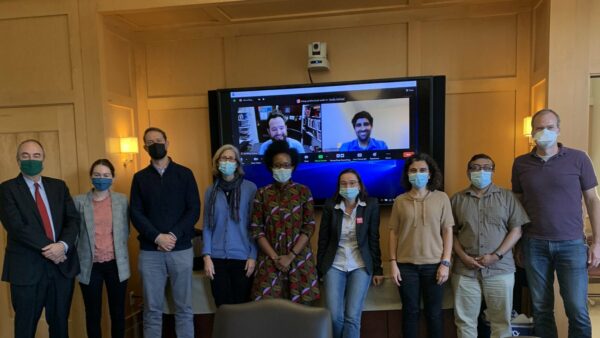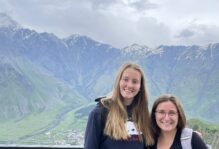Turning the page into a new chapter: From dissertation to book
By Alexandra Byrne ’23
In an effort to hone her book’s argument, organization, and style before it goes to publishers for review, Assistant Professor of Government Dr. Kelebogile Zvobgo invited scholars from across the country to a book workshop at William & Mary. In late October, the group convened in Chancellor’s Hall to discuss Zvobgo’s manuscript, which analyzes the influence of non-governmental organizations on transitional justice processes.
This topic aligns with the work Zvobgo does as Director of the International Justice Lab, based at the Global Research Institute, where she mentors undergraduate fellows conducting research on human rights, international law, and transitional justice. Gathering with experts across these fields to hear their feedback felt surreal, she said.
“I cannot believe today is here,” Zvobgo said. “Both because it means I finished a dissertation and I finished my PhD and have begun this process of transforming the project into a book. It’s exciting and bewildering, and it feels like I was just at USC yesterday going to my first book workshop.”

Scholars from across the country gathered to discuss Zvobgo’s manuscript, which analyzes the influence of non-governmental organizations on transitional justice processes.
Much of Zvobgo’s work, and the in-progress book, deals with truth commissions, which are quasi-judicial bodies that investigate and record human rights violations and other abuses that have taken place during a civil conflict, political regime, or other period of violence. The commission is generally charged with producing a report, in which it also makes a series of recommendations for the government to implement post-transition.
Because these recommendations are non-binding, Zvobgo’s book thus probes the question of which are implemented and why. She makes the argument that NGOs — on both the international and domestic levels — have a vital role to play in pushing for the issues they believe are important.
In attendance was Monika Nalepa, an associate professor of political science at the University of Chicago. Her first book, Skeletons in the Closet: Transitional Justice in Post-Communist Europe, answers several essential questions about transitional justice and democratization in post-Soviet countries, including why transitional justice measures were adopted in the first place. Nalepa was joined by Laia Balcells, a Provost’s Distinguished Associate Professor of Government at Georgetown University who specializes in transitional justice following armed conflict. Her past research has particularly engaged politics of the Spanish Civil War. Lastly, Geoff Dancy, an associate professor at Tulane University, joined the workshop via Zoom. He is director of the Transitional Justice Research Collaborative, a prominent group of scholars from leading universities worldwide that have compiled and made publicly available data on human rights prosecutions, truth commissions, and amnesties.
“This project stems from my dissertation of the same title, ‘Governing Truth: NGOs and the Politics of Transitional Justice,’” Zvobgo said. “I knew right away, in fact as I was putting my spreadsheet together of all the things I was asking for when I was coming here, that I wanted to have a book workshop where Monika would be here, and Laia, and Geoff, and I am so delighted that that entry on my spreadsheet is now people in this room and on Zoom.”
Joining the three visiting scholars were members of the William & Mary community: Vice Provost of Academic & International Affairs Steve Hanson, Assistant Professor of Government S.P. Harish, Professor of Government Paula Pickering, Associate Professor of Government Philip Roessler, Associate Professor of Government Maurits van der Veen, and Assistant Professor of Government Sharan Grewal. Francesca Parente, an assistant professor and Director of the Reiff Center for Human Rights at Christopher Newport University, was also in attendance.
“This project means a lot to me, and you all mean a lot to me, professionally and otherwise, so thank you for being here,” Zvobgo said before beginning.
Over the next eight hours, the group thoughtfully scrutinized each of the seven chapters in turn. For each chapter, there were two discussants who shared questions, comments, and concerns before opening the conversation up to the group for additional thoughts. Nalepa said though her feedback can be tough, she aimed to make it useful and constructive.
“I just wanted to say that the fact that I’m here shows how much appreciation I have for this manuscript,” Nalepa said.
Pickering agreed, and also pointed to the uniqueness of Zvobgo’s Varieties of Truth Commissions datasets, which provide data on truth commissions that has never before been collected. With help from research fellows in the International Justice Lab and the Security and Political Economy Lab at the University of Southern California — where Zvobgo earned her PhD — she compiled novel data on the mandates, reports, and recommendations made by truth commissions from 1970 to 2018.
“I just love the way that you painstakingly collected this data along with the help of a lot of research assistants and coded it, and really used that in an intentional way to directly answer your substantive question,” Pickering said.
Beyond coding for the book project, the International Justice Lab has worked on a number of projects, on topics ranging from memorialization as transitional justice, the participation of children in truth commissions, and the emergence of local and national truth commissions in the United States. Zvobgo and the fellows have also written public scholarship for outlets such as Foreign Policy and the Washington Post’s Monkey Cage.
Zvobgo will spend the coming months editing her manuscript based on the feedback she received at her workshop. In the meantime, stay up to date on IJL’s research projects at internationaljusticelab.org.
Dr. Kelebogile Zvobgo served as a Global Research Institute Pre-Doctoral Fellow from 2019 to 2021.




No comments.
Comments are currently closed. Comments are closed on all posts older than one year, and for those in our archive.